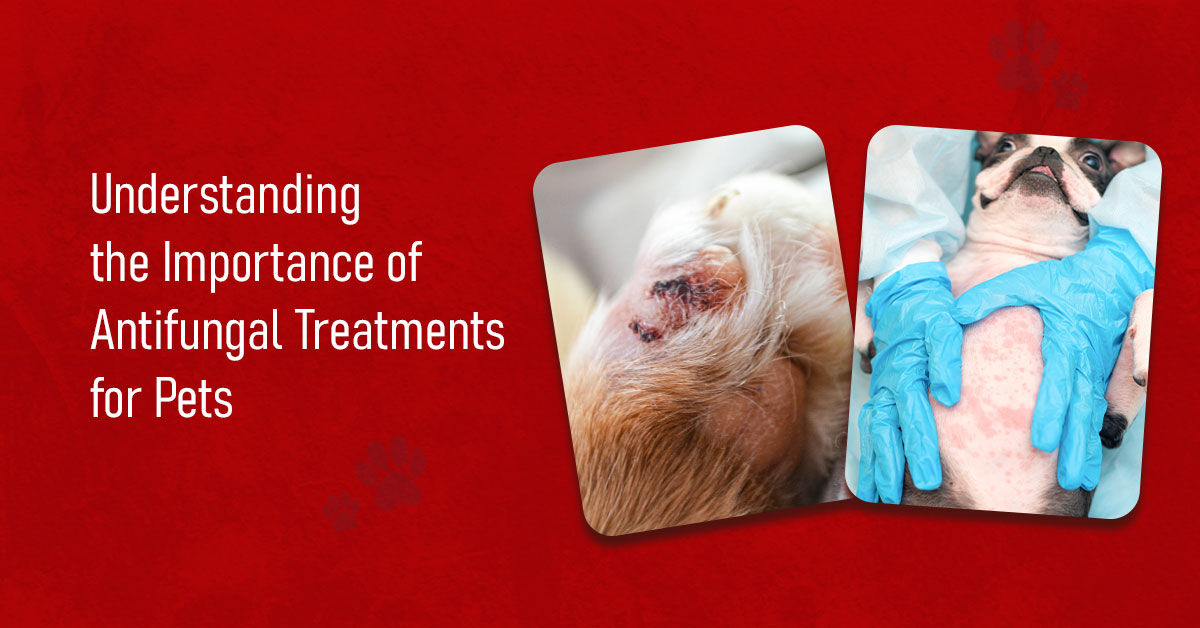Table of Contents
More from Blog
Understanding the Importance of Antifungal Treatments for Pets
May 10, 2025

As pet parents, ensuring the health and comfort of our pets is a top priority. Just like humans, pets are vulnerable to infections, especially those affecting the skin, ears, paws, and sometimes internal organs. One of the most common yet often underestimated issues is fungal infections in pets.
If left untreated, fungal infections may progress from mild irritation to more serious health concerns. This is why timely and appropriate antifungal treatments for pets play a vital role in maintaining their overall well-being.
What Are Fungal Infections in Pets?
Fungal infections are caused by various fungi that thrive in warm and moist environments. Pets can develop these infections on different parts of the body, depending on exposure and immunity.
Common Types of Fungal Infections in Pets
- Ringworm in pets
Causes circular hair loss, scaly skin, redness, and itching. It can be contagious. - Yeast infections
Commonly affect ears, paws, and skin folds. Symptoms include redness, itching, discharge, and unpleasant odour. - Aspergillosis
Affects the respiratory system and may cause sneezing, nasal discharge, or breathing difficulty.
Even mild fungal infections should not be ignored, as they can worsen without proper veterinary care.
Why Antifungal Treatments Are Essential for Pets
Prevents Spread and Contamination
Certain fungal infections can spread between animals and even to humans. Early antifungal treatment helps control transmission and protects the household.
Relieves Discomfort
Fungal infections often cause persistent itching, pain, and inflammation. Pets may scratch excessively, leading to secondary bacterial infections. Antifungal medicines help manage infection-related irritation and support recovery when used under veterinary guidance.
Avoids Long-Term Health Complications
Untreated infections may affect deeper tissues and, in some cases, internal systems. Timely treatment reduces the risk of chronic skin damage or systemic illness.
Maintains Healthy Skin and Coat
Healthy skin acts as a natural barrier. Treating fungal infections early helps preserve coat quality and prevents scarring or hair loss.
Types of Antifungal Treatments for Pets
Different infections require different approaches. A veterinarian will recommend the most suitable option based on severity.
Topical Antifungal Treatments
Includes creams, sprays, and medicated shampoos. These are ideal for mild and localised infections such as ringworm or yeast overgrowth.
Oral Antifungal Medications
Used for deeper or widespread infections. These medicines are used for certain infections and must be prescribed and monitored by a veterinarian.
Antifungal Ear Drops
Specifically designed for ear yeast infections. Useful when pets show head shaking, ear redness, or foul-smelling discharge.
Injectable Antifungals
Reserved for severe systemic infections and administered only by veterinarians.
Consult your veterinarian before use.
How to Identify Fungal Infections Early
Early detection leads to faster recovery. Watch out for:
- Persistent itching or licking
- Red, inflamed, or scaly skin
- Circular hair loss patches
- Foul-smelling ears or discharge
- Unusual odour from skin or paws
- Sneezing or breathing difficulty in specific fungal conditions
If symptoms persist, veterinary diagnosis is essential for accurate treatment.
Preventing Fungal Infections in Pets
Regular Grooming
Routine bathing and brushing help remove dirt and moisture. Use vet-recommended shampoos when required.
Clean Living Environment
Keep bedding, toys, and resting areas dry and hygienic. Moist surroundings promote fungal growth.
Balanced Nutrition
Good nutrition supports overall health and immune function, which is important for general resistance to infections.
Routine Veterinary Check-ups
Regular check-ups allow early identification of skin or ear issues before they worsen.
Liver Support During Antifungal Treatment
Why Liver Supplements Matter
Some antifungal medicines are metabolised through the liver. Supporting liver function during treatment helps maintain overall health.
Supporting Recovery
Liver supplements may be used as part of supportive care during treatment, based on veterinary advice. Always use supplements recommended by a veterinarian.
Frequently Asked Questions (FAQs)
What causes fungal infections in pets?
They are commonly caused by moisture, poor hygiene, weak immunity, or exposure to infected animals or environments.
Are fungal infections contagious?
Yes, some infections like ringworm can spread to other pets and humans.
Can fungal infections heal without treatment?
Some mild cases may show temporary improvement, but veterinary evaluation is important to determine whether antifungal treatment is required.
How long does antifungal treatment take?
Treatment duration varies depending on severity and type of infection. Always complete the full course prescribed.
Are antifungal medicines safe for pets?
When used as directed by a veterinarian, antifungal medicines are generally safe.
Should liver supplements be given with antifungal medicines?
They may be recommended to support liver health during treatment. Consult your veterinarian before use.
Conclusion
Fungal infections are a common but manageable health concern in pets. Understanding symptoms, choosing the right antifungal treatments for pets, and following preventive care can make a significant difference in recovery and comfort.
With proper veterinary guidance and trusted veterinary medicines, pet parents can ensure effective treatment while maintaining long-term skin, ear, and coat health.
For veterinary products used in antifungal care, skin hygiene, ear care, and supportive management, explore Azista Vet's range in consultation with your veterinarian.




